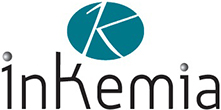InKemia IUCT group has the following capacities in the Chemicals synthesis sector:
Medicinal chemistry
- Design and synthesis of new chemical entities (Hit-finding)
- Design and synthesis to obtain libraries by parallel synthesis
- Hit to lead and lead optimization
- Optimization of synthetic routes and scale up
Custom Synthesis
- Synthesis of building blocks and non commercial scaffolds
- Synthesis of patterns and impurities
- Synthesis of reference compounds and metabolites
New Synthetic Routes
- Set up of new synthetic routes
- Design of new synthetic routes that are not published or patented
- Experimental design and optimization of chemical synthesis: yields, selectivity, crystallization and impurities.
- Minimization of synthesis steps and isolations
- Design and synthesis of new compounds
- Generation reduction of toxic and dangerous by-products
- Processes without salt generation
- Processes without solvents
- Development of processes with minimum solvent consumption
- Optimization of the synthesis methodology in both solid and liquid phase
- Safer reactive compounds
Optimization of chemical processes
- Optimization of processes using LABMAX (kilolab) automatic reactor
- Cost reduction by redesigning of synthetic processes
- Substitution of dangerous reactive compounds
- Development of validation processes and scale up
Revaluation of industry’s by-products
- Use of by-products as raw material for new processes
- New applications for industrial by-products
Structural Elucidation Studies
- Structural elucidation studies
Chemical biotransformation
- Chemical synthesis using microorganisms
- Fermentation processes
- Biotechnological processes for chemical products of large tonnage (biopolymers, solvents, bio monomers) and fine chemistry
- Obtention of novelty enzymes as industrial biocatalysts for fine chemistry and large productions
- Development of minimal and artificial microorganisms: synthetic biology
Alternative Solvents
- Solvent substitution
- Development of new solvents with low toxicological profile for industrial use
- Synthesis of active principals with safe solvents
- New uses for alternative solvents
Instrumental Techniques
- LABMAX (kilolab) automatic reactor
- Reactor with computerized control of the reaction variables: temperature of the reaction, temperature of the jacket, agitation speed, flow of the reactive addition, pH control, control probes, distillation control.
- Reactor from 1-3 L, also pressure reaction up to 1 litre.
- Gas Chromatography- Flame Ionization Detector (GC-FID)
- Gas Chromatography Mass Spectrometry (GC-MS)
- Gas Chromatography, Head Space
- HPLC-UV
- HPLC, Mass Spectrometry (MS)
- Flame Atomic absorption spectroscopy
- Graphite furnace atomic absorption spectrometry
- FT-IR
- molecular absorption spectroscopy, UV-Visible
- NMR (400 MHz)
 English
English  Portuguese
Portuguese  Català
Català  Español
Español 